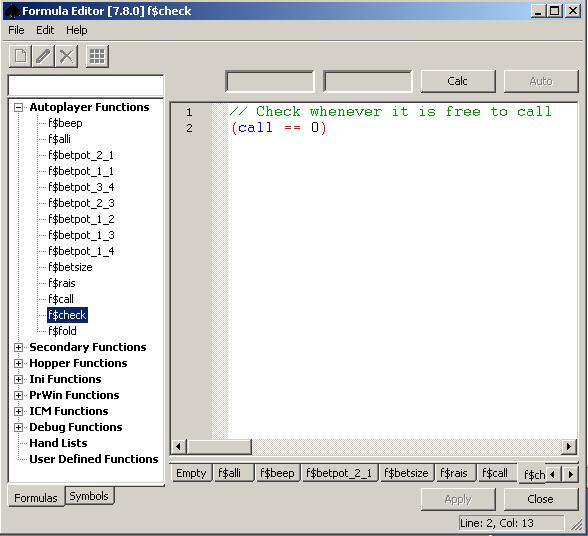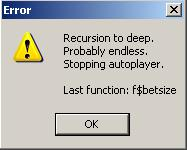The Bot Logic (OH-script)
OH-Script
Every bot needs some poker-specific logic to decide how to act. OpenHoldem provides a basic scripting-language for that, which was inherited from WinHoldem. The logic is action-centered, i.e. everytime it is your turn the following basic questions have to be answered:
- “shall I go allin?” — f$alli (boolean, interpreting 0 as false and everything else as true)
- “shall I click a betpot-button?” — f$betpot_2_1...f$betpot_1_4 for twice betpot to 1/4 betpot.
- “shall I raise, and how much?” — f$betsize
- “shall I (min-)raise” — f$rais (mainly for Fixed Limit; boolean)
- “shall I call” — f$call (boolean)
- “shall I check” — f$check (boolean)
- “shall I fold” — f$fold (boolean)
Per default f$check evaluates to true if it is free to call and f$fold is always true, so if all questions were answered with 0 or false, your hand-will be check-folded.

OH-script uses C(++)-style mathematical expressions, i.e. the same mathematical operators like the C-programming-language and OpenHoldems built-in symbols. An example:
##f$sitout## 0 // 0=off 1=on && issittingin // i am sitting in && (betround==2 || betround==3) // it is the flop or turn && nopponentsdealt<=5 // 5 or less opponents
The DLL-extension
Every bot needs such a formula file, even if it is programmed in C++. There are no standalone C++-bots; the user-DLL is just a programming extensions that make it possible to extend the functionality of OpenHoldem by providing additional symbols (constants and parameter-less functions). The very minimum is a small OH-script or OpenPPL formula that redirects every primary function to a DLL-function.
##notes## // Very small OH-formula, that redirects // primary functions to C++-functions in the user.DLL. ##f$alli## dll$alli ##f$betsize## dll$betsize ##f$rais## dll$rais ##f$call## dll$call
In practice formulas can become arbitary complex, but those are the basic principles you will need to understand. We will deal with the details of bot-programming in the chapter about OH-script.
Parse-Time and Run-Time Errors
The OpenHoldem scripting language will detect various error conditions for you and warn you of these conditions. Each time a formula is loaded, it is “parsed” for correctness – if there are any syntactical errors upon this parse, then a message box will be displayed that alerts you to the location of this error.
Additionally, several classes of run-time errors will be detected, including divide-by-zero and infinite recursion. Note that the OH-Script language does not support recursion in any form, due to the absence of the assignment operator and function parameters to control the recursion depth.

Default Bot
All OH-script-bots are self-contained. Once all questions f$alli .. f$fold have been answered the best action is well-defined. Therefore OH-script does not support a default-bot. “All power (and responsibilities) to the user” is the motto of OH-script. Things are slightly different for OpenPPL, the other programming language, however. An OpenPPL-bot might be “incomplete”. The end of a code-section might be reached without a matching action being found, then the default.bot will take over. We will talk about OpenPPL and this default-bot in the next chapters briefly; all the details are in an extra handbook, the OpenPPL-manual.